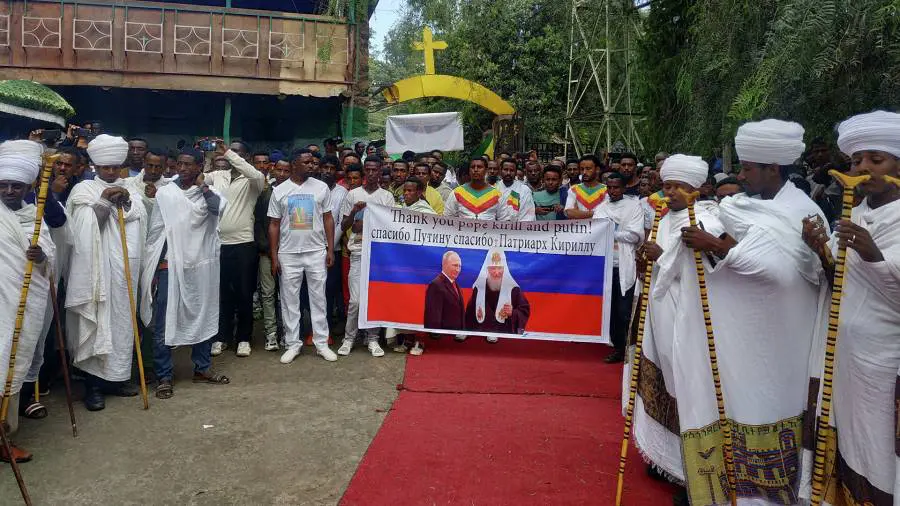Metropolitan Hilarion (Alfeev): Believers in Africa greet us with “Thank you Putin” posters
Russian President Vladimir Putin awarded the chairman of the Moscow Patriarchate’s Foreign Affairs Department, Metropolitan Hilarion (Alfeev), with the Alexander Nevsky Order for his “contribution to the development of international and interfaith relations.”
In his speech of thanks, the Bishop of Volokolamsk. Hilarion, dubbed the “foreign minister of the Russian Church,” focused on Africa. He compared the work of his department to the Ministry of Defense, as in recent years it has increasingly had to guard the “sacred borders of the Russian Church.” He likened the church to an empire with centuries of history: “The Russian Church has been created for more than ten centuries and we have inherited it within the boundaries within which it was established. We did not create it and we will not destroy it. We will continue to fight the challenges she faces today.”
Then Mitr. Hilarion called on President Putin to protect “persecuted Christians in Africa,” where a month ago the ROC expanded its borders by creating an “exarchate.”
According to the metropolitan, the Russian army has done a lot to protect Christians in Syria, but now there are other countries in the world where Christians are persecuted. There are especially many such countries in Africa:
“Thanks to the Russian army, terrorists have been driven out of Syria, but in a number of other countries in the Middle East, where Christians are being attacked by terrorists and radical groups, they also need protection and help from Russia. “Particular attention must be paid to Africa today: in some countries there is widespread persecution of Christians,” said Metropolitan Hilarion.
Believers in Africa looked with hope to Russia and its president, to the Russian Orthodox Church and its patriarch Kirill. “They take to the streets with placards: ‘Thank you, Putin, thank you, Patriarch Kirill.’ I would like to join in these words of gratitude, “the Metropolitan concluded.
The word of Metropolitan Hilarion (Alfeev) provoked public reactions. According to Russian expert and former Moscow Patriarchate official Sergei Chapnin, this is proof that the MP’s decision to open its exarchate in Africa is, at first glance, dictated solely by the conflict with the Patriarchate of Alexandria over Ukrainian autocephaly. The real reason is the coordination of church policy with Russia’s foreign policy, which in recent years has expanded Russia’s unofficial military presence through so-called private armies in a number of African countries.
Ukrainian journalist Tatiana Derkach writes: “The Moscow Patriarchate, like the Kremlin, is waging a hybrid war. According to documents, the canonical territory of the ROC is the borders of the Moscow Empire at the end of the 16th century. This is how the Greeks have always recognized it. In practice, he considers the entire post-Soviet space and even more to be his canonical territory. And now Africa has been added. Do you know what is the funniest? That now Patriarch Kirill can boldly add to his title “Moscow and all of Russia” – “and all of Africa.”
According to experts, the specificity of Orthodoxy in Africa is that it is subsidized. In traditionally Orthodox countries such as Greece, Cyprus, Romania or Bulgaria, the salaries of priests are borne by the state. In many European countries, such as Ukraine, Serbia or Russia, the clergy are supported by believers who make donations. And in Africa and in countries with very poor populations, all religious life is subsidized by international funds or the budget of religious missions. According to Archim. Cyril (Govorun) currently the average salary of priests in Orthodox parishes in African countries is about 50-100 dollars. At the end of each year, missionary campaigns are organized, primarily in Greece and Cyprus, to raise funds for mission budgets in various African countries. According to him, the ROC now offers the clerics who passed to it about $ 200.
Political scientist Alexander Morozov also spoke about the diplomatic role of the ROC and the cooperation with the Ministry of Foreign Affairs. According to him, “over the last seven years, the presence of Russians in Africa has increased significantly. These are the various private military formations, state corporations that extract minerals, trade missions, intelligence. All these people are Russians. The ROC will collect them centrally. And then we will be able to talk about the “Russian world in Africa.” The ROC will be a classic tool for a “soft power” that conducts humanitarian policy, the “right” memory policy, and, of course, will provide a base for special services. The Moscow Patriarchate will sell its friendly ties to local regimes to the Kremlin. In the same way as it did in Ukraine until 2014.”
The photo is from the end of 2019, when a Russian delegation visited Ethiopia at the invitation of the Pre-Chalcedonian Ethiopian Orthodox Church; other similar events were not covered in the Russian media.







